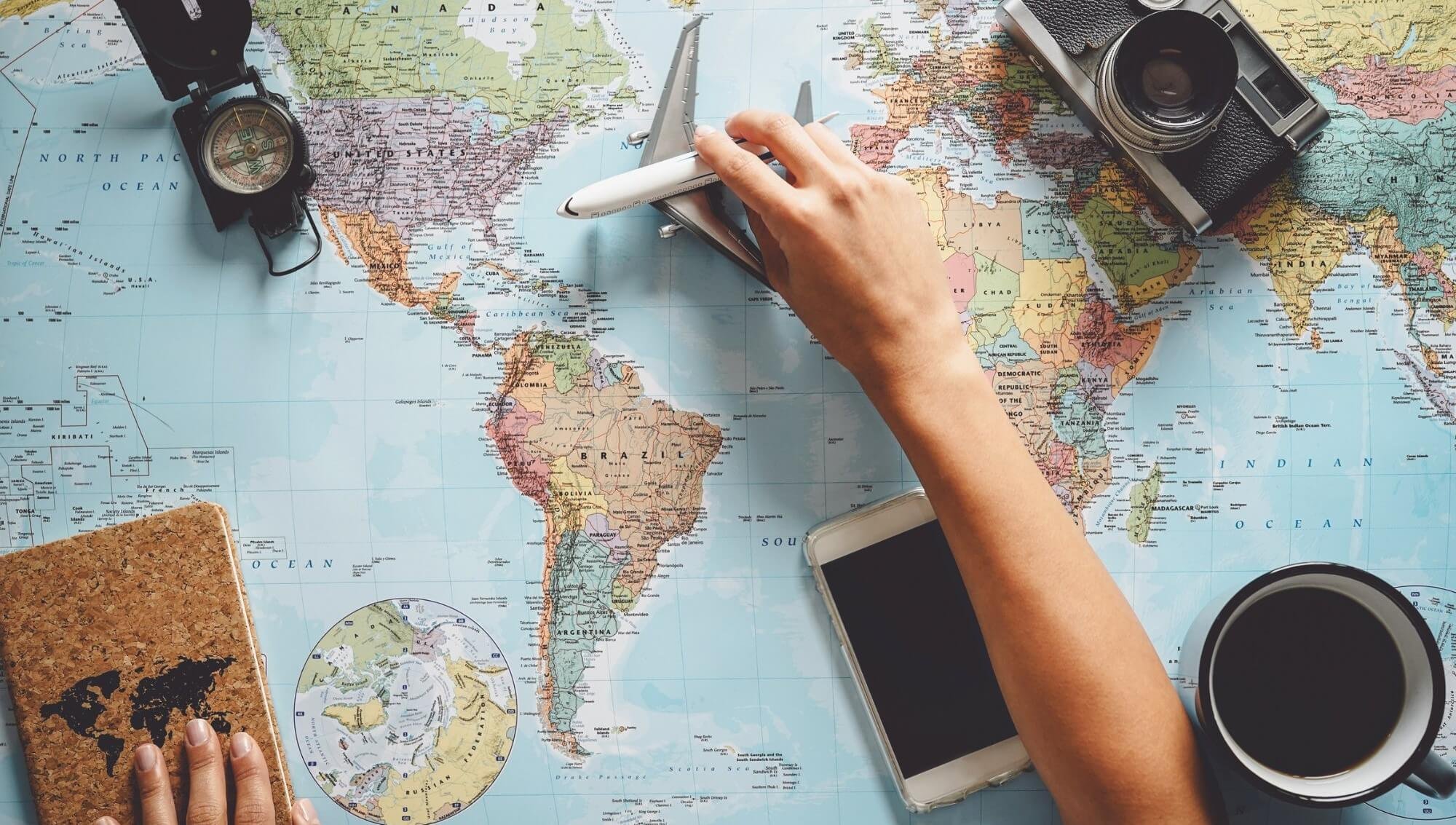Africa Travel Guide: 10 Things You Need to Know Before Visiting Africa
Africa is not a country! If you’ve always thought otherwise, I’m here to burst your bubble.
Africa is a continent of breathtaking landscapes, rich cultures, and vibrant communities. Think about a safari in the Serengeti, relaxing on the beaches of Zanzibar, or exploring the bustling markets of Marrakech. There’s a magical allure to Africa that draws travelers from around the globe.
In this blog post, we explore 10 things you need to know before visiting Africa, with pro tips that will make your first visit memorable. Let’s get into it.
-
1. Africa is a continent not a country
2. The Importance of Vaccinations and Health
3. Respect Local Cultures and Traditions
4. Stay Hydrated and Mindful of Food Choices
5. The Importance of Local Currency
6. Transportation Options Vary Widely
7. Safety First: Be Aware of Your Surroundings
8. Wildlife Etiquette: Respect the Animals
9. Plan for Connectivity: Internet and Communication
1. Africa is a Continent, Not a Country
First things first, Africa is not a country. As a tour guide, I have hosted many guests who have had the mindset that Africa was just a small country on the globe.
Contrary to this mindset, Africa is a continent made up of 54 diverse countries, each with its own unique cultures, languages, and traditions. From the pyramids of Egypt to the wildlife of Kenya, and the beaches of South Africa, every country offers a different experience.
So, when someone says they’re “going to Africa,” ask them where exactly! It’s like saying you’re going to Europe and not specifying if it’s Italy, France, or Norway.
Pro Tip
Research Your Destination: Before you set off, take some time to research the specific countries you plan to visit. Each has its own visa requirements, health precautions, and cultural customs. Knowing this will not only make your trip smoother but also show respect for the local cultures.
2. The Importance of Vaccinations and Health
Health is an essential aspect of traveling, especially in a continent as diverse as Africa. Depending on where you’re going, vaccinations for diseases like Yellow Fever, Hepatitis A, and Typhoid may be recommended or required.
Malaria is another concern in certain regions, so don’t forget to pack those mosquito repellents.
Pro Tip
Consult a Travel Clinic : Before your trip, consult a travel clinic to discuss the necessary vaccinations and health precautions specific to your destination. They can also provide you with medications for malaria prevention if needed.
3. Respect Local Cultures and Traditions
Check out these African destinations for your trip
With over 3,000 ethnic groups and more than 2,000 languages spoken across Africa, cultural sensitivity is vital. Each community has its own customs, traditions, and social norms. Dressing modestly, learning a few local phrases, and being respectful of customs can go a long way.
Pro Tip
Embrace Local Etiquette: For example, in many cultures, it’s customary to greet people before starting a conversation. A simple “Jambo” (hello in Swahili) or “Sannu” (hello in Hausa) can break the ice and show your respect for the local culture.
4. Stay Hydrated and Mindful of Food Choices
Africa’s climate can vary significantly, from arid deserts to lush rainforests. Staying hydrated is crucial, especially in hotter regions. Drink plenty of water, and be cautious about where it comes from. Bottled water is often the safest option.
When it comes to food, Africa is a culinary delight! From spicy tagines in Morocco to savory bunny chow in South Africa,the famous Ghana jollof, there’s much to savor.
However, be mindful of street food and ensure it’s freshly prepared to avoid any tummy troubles.
Pro Tip
Try Local Delicacies: Don’t shy away from trying local dishes! Just be prepared for some interesting ingredients. You might find yourself enjoying a plate of ugali in Kenya or fufu in Ghana.
Who knows? You might discover your new favorite dish!
5. The Importance of Local Currency
While credit cards are accepted in major cities and tourist areas, cash is still king in many parts of Africa. Local markets, remote areas, and smaller businesses often operate on a cash-only basis. Be sure to have some local currency on hand to avoid any awkward situations.
Pro Tip
Use Local ATMs Wisely: Using ATMs in major cities can be a convenient way to get cash, but always choose machines located in secure areas. Also, notify your bank of your travel plans to avoid any issues with your cards while abroad.
6. Transportation Options Vary Widely
Transportation in Africa can vary significantly depending on where you are. In urban areas, ride-sharing apps like Uber are available in some cities, while in rural areas, public transport might consist of colorful “matatus” (shared minivans) or even donkey carts!
Pro Tip
Embrace the Adventure: Don’t be afraid to embrace the adventure of local transportation! It’s a great way to experience daily life and meet locals. Just be prepared for a few unexpected detours and delays. After all, it’s all part of the African journey!
7. Safety First: Be Aware of Your Surroundings
Like any travel destination, safety should be a priority. While many parts of Africa are safe for tourists, it’s essential to stay aware of your surroundings and take common-sense precautions.
Avoid displaying valuables, be cautious when walking alone at night, and stay informed about the areas you’re visiting.
Pro Tip
Stay Informed: Keep an eye on travel advisories from your government and stay informed about local news while you’re there. Joining local groups on social media can also provide valuable insights from fellow travelers.
8. Wildlife Etiquette: Respect the Animals
Africa is famous for its wildlife, and for good reason! From the Big Five to the smallest critters, observing animals in their natural habitat is a breathtaking experience. However, it’s crucial to respect wildlife and follow proper etiquette.
Pro Tip
Follow Your Guide’s Instructions: If you’re going on a safari, listen to your guide’s instructions. Keep a safe distance from animals, don’t feed them, and avoid making loud noises. Remember, you’re a guest in their home!
9. Plan for Connectivity: Internet and Communication
While many urban areas have good internet connectivity, rural regions may not be as reliable. It’s wise to plan ahead for communication needs, especially if you’re relying on maps or travel apps.
Pro Tip
Get a Local SIM Card: Consider getting a local SIM card for your phone upon arrival. This can provide you with better rates for data and calls, making it easier to stay connected during your travels.
10. Pack Smart: Essentials for Your Trip
Lastly, packing smart is essential for any trip, but especially for Africa. Depending on where you’re going, you’ll want to pack for a range of climates and activities. Here are some essentials to consider:
Lightweight, breathable clothing for hot days
Warm layers for cooler evenings
Comfortable walking shoes for exploring
A good camera to capture breathtaking landscapes and wildlife
A reusable water bottle to stay hydrated and eco-friendly
Pro Tip
Don’t Overpack: While it’s important to be prepared, try not to overpack. You can often find local shops for any last-minute essentials, and it’s always nice to leave room for souvenirs!
Conclusion
There you have it adventurer, the 10 Things You Need to Know Before Visiting Africa! By keeping these tips in mind, you’ll be well-prepared to embrace the adventures that await you.
Get ready to immerse yourself in the warmth of African hospitality, savor delicious cuisine, and explore the stunning natural beauty the continent has to offer.
Safe travels, and may your journey be filled with joy, discovery, and a whole lot of fun.
Download my free travel guide to navigating Accra- Ghana from hotels to stay at, restaurants to try out, how to stay safe when visiting and nightlife recommendations for my fellow night owls who would love to go dancing.
Hello, fellow adventurers! I'm Rashida, your not-so-typical travel guide. Join me for laughs, mishaps, and perhaps a questionable decision or two (because let's face it, those always make for the best stories). Learn More

















